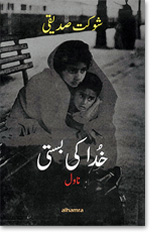 |
| Strong novel against Hindu, Muslim communalism |
A gentleman, Rao Sahab, has asked me about literary works of Indian Muslims that can give him a peek into the culture, thought process, fears, anxieties, hopes and aspirations of the minority community.
I think the post should be regarding novels on Indian Muslims.
Yes there are some books which are a must read for not just Muslims but non-Muslims in this country as well.
I thought I should share with you. I recommend these books to everybody. Here is a list of the major works of fiction, many of whom have been translated in English and Hindi also.
1. Qurratul Ain Haider's Aag ka Darya translated as River of Fire is one of the greatest novels ever written in any language. The characters of Gautam Nilambar, Kamaal and Champa
appear in different eras--from the period of Chandragupta Maurya to Sultanate era, Mughals, arrival of East India company and later when India gets divided into Hindustan and Pakistan.
2. Abdus Samad's '
Do Gaz Zameen' that deals with psyche of Muslims until Bangladesh's creation and after. It has been translated in almost a dozen languages.
3. Salahuddin Parvez' Shinakhtnaama or Identity Card, a landmark work in the backdrop of Ayodhya Movement. Apart from the story, its the style that captures the imagination of the reader.
4. Rahi Masoom Raza's 'Topi Shukla', a must-read for all Indians, a small novel originally in Hindi which I am sure
can change the thinking of fanatic Hindus and Muslims and force them to introspect.
The boy who was dark complexioned, not loved by parents, hated Muslims in his young age and took admission in Aligarh Muslim University (AMU) to see these 'anti-nationals', later lives a bohemian life, befriends Muslims, falls in love with Muslim girl and has a rather tragic end.
Raza who wrote script of Mahabharat is a master and his command over the dialects of UP and understanding of human psychology, belief in secularism and communal harmony is unparalleled.
5. Raza's Adha Gaon or a Village Divided [recently translated in English] is another beautiful novel about Muslims, particularly the Shia Muslims and their culture, in country side of Uttar Pradesh [Ghazipur's rural and qasbah life].
 |
| Qurratul Ain Hyder |
6. In Hindi, Manzoor Ahtesham's Sukha Bargad translated as 'A Dying Banyan'. It has also become a sort of classic now as it explores Hindu-Muslim relations in the post-independence era.
7. Another interesting one is Asghar Vajahat [or Wajahat's] 'Saat Aasmaan'. The novel has ample humour as Wajahat's characters have interesting anecdotes & stories to recount, which keep you hooked.
Yet another Rahi Masoom Raza novel, 'Neem ka Ped' on which a TV serial was based, comes to mind. Rahi also wrote 'Himmat Jaunpuri', which is not too easily available these days.
8. Abdul Bismillah's 'Jhini Bini Chadaria' is considered a good novel as it deals with weavers of Benares though I was not impressed much with it. The fact that novel deals about poor Muslims and not Nawabs, Upper Class or Aristocrats is noteworthy.
9. A unique novel is
Kaala Jal by Gulsher Khan Shani, one of the first Muslim writers to take up Hindi as a medium of expression, instead of Urdu. The setting is in remote Bastar, the heart of tribal territory. A television serial on the novel with
Pallavi Joshi as lead character was quite a hit in the mid-80s.
10. Ilyas Ahmad Gaddi's brilliant work 'Fire Area' is about the miners in coal fields of Bihar. Gaddi's novel has been acclaimed one of the best works in Urdu fiction in India in the last decade or so. Unfortunately I haven't read it.
11. Musharraf Alam Zauqi's 'bayaan' is a major novel. It deals with the insecurities and frustration that had gripped Muslims after demolition of Babri Masjid and the riots in Mumbai, Surat etc.
I have not read Syed Mohammad Ashraf's 'Nambardaar ka Neela' that got great reviews. There are other good Muslim authors who have written good novels but firsthand I remember these and all of them are a must-read.
Amongst the earlier works is Hayatullah Ansari's voluminous Lahoo ke Phool, which I unfortunately couldn't read.
 |
| Udas Naslein translated in English |
12. The query is about Muslim writers otherwise I was reading Ravindra Kalia's famous 'Khuda Salaamat Hai' and was enchanted by it.
Set in a mohalla of a North Indian town that has an equal population of Hindus & Muslims, inhabited by shopkeepers, mullahs, pundits, tawaifs & all sorts of people, it depicts the strength of our common heritage & ganga-jamuni culture.
Shamsur Rahman Faruqi has written 'Kai Chand The Sar-e-Aasman', but we await a magnum opus from him on partition and its impact on composite cultural heritage.
Besides, Khushwant Singh's '
Delhi' is one of my favourites. No matter what people say about the 'vulgarity' in the novel, it remains the best work on Delhi along with
Ahmad Ali's 'Twilight in Delhi' which is now considered a legendary work.
Ahmed Ali's novel is in a class of its own. It gives a glimpse into the Dehlvi tehzeeb of yore, the life and culture in Delhi, before partition.
And whenever it comes to partition, it is impossible to forget Saadat Hasa Manto. Among short stories I rank Hindi writer Nasira Sharma and her 'Patthar Gali' quite highly. In fact, I have suggested more than 20 novels by now. Enough for this post, I guess.
































